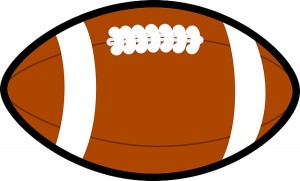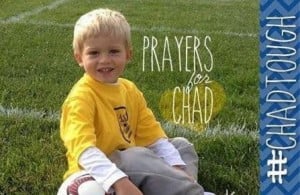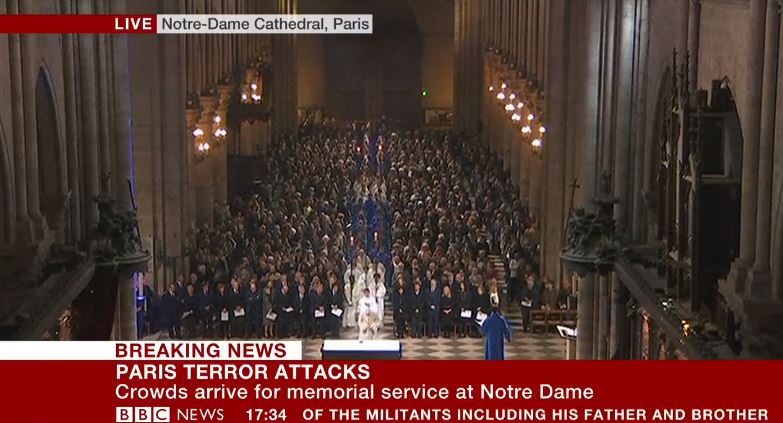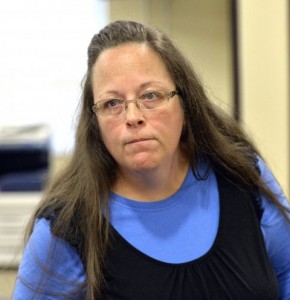Students and sports fans at Shanley High School, a private Catholic school in Fargo, North Dakota, have traditionally said a prayer before the football game in their school stadium. Now, though, that has to stop! The North Dakota High School Activities Association has told Shanley H.S. officials that they cannot say a prayer over their own P.A. system, in their own football stadium, before a playoff game this Saturday, because it’s a violation of the separation of Church and State.
THE PROHIBITION AGAINST PRAYER IN SCHOOLS
The whole “no prayer in public schools” thing had its origins in the case of Engel v. Vitale, in which the U.S. Supreme Court ruled on June 25, 1962, that state-sanctioned or mandatory prayer cannot be required of students because of the Establishment Clause of the First Amendment to the U.S. Constitution. The Establishment Clause says:
Congress shall make no law respecting an establishment of religion, or prohibiting the free exercise thereof…
The Establishment Clause required that any practice sponsored within state run schools (or other public, state sponsored activities) must adhere to the following three criteria:
- Have a secular purpose;
- Must neither advance nor inhibit religion; and
- Must not result in an excessive entanglement between government and religion.
The “Regents’ Prayer” which offended Steven Engel had been approved by the New York Board of Regents for use in schools. Engel and other secular parents met with the New York Civil Liberties Union to challenge the constitutionality of the prayer in court.
The prayer itself was actually quite nondescript, and not specifically Trinitarian. It said simply:
“Almighty God, we acknowledge our dependence on Thee, and we beg Thy blessings upon us, our parents, our teachers, and our Country.”
On June 25, 1962, the Supreme Court ruled that any form of prayer in a public school is unconstitutional.
WHY SHANLEY HIGH SCHOOL IS DIFFERENT
Shanley High is a private Catholic school, and as such, prayers are permissible. There has been no problem with the prayer throughout the entire football season; in fact, students and sports fans have come to expect it.
ASSISTANCE FROM THE THOMAS MORE SOCIETY
The school enlisted the help of attorneys at the Chicago-based Thomas More Society to challenge the ban. On Thursday, November 7, the Thomas More Society, a national public-interest law firm, sent a letter to the Association, requesting that the Shanley High School not be hindered from exercising their Federally protected rights.
The full text of the Thomas More Center’s letter follows:
Re. Private Prayer at Shanley Playoff Football Games
We represent Shanley High School (“Shanley”), which is a private Catholic school in Fargo, ND. Shanley’s football team has advanced to the playoffs this year and the school has sought our help after being informed by the North Dakota High School Activities Association (the “Association”) that it would not be permitted to say a prayer over its own PA system, at its own football stadium, while hosting the playoff game in which it has earned home field advantage.
Specifically, our client has informed us that your position is that permitting prayer before the football game is prohibited by the Supreme Court’s decision fifteen years ago in Santa Fe Independent School District v. Doe. 530 U.S. 290 (2000). There, the Court ruled that a public school’s framework of permitting students to vote on whether to pray before football games, and vote for which student would offer the prayer, still bore the imprimatur of official, government speech, and as such violated the Establishment Clause by endorsing religion. Id. at 313 (noting that the invocations were “authorized by a government policy and t[ook] place on government property at government-sponsored school-related events”).
Santa Fe is certainly binding on public schools when it comes to the question of prayer before sports games.
However, our understanding is that the Association’s position is that playoff games are “sponsored” by the Association itself, and that that “sponsorship” somehow converts Shanley’s football field into state property and Shanley into a state actor. This “sponsorship” is illusory; in all material respects, Shanley will be hosting the game exactly as it does in the regular season—it will, for example, run ticket sales, organize and sell concessions, provide an announcer to announce the game, and provide down markers, for example.
Under Supreme Court precedent, Establishment Clause violations in the nature of endorsement of religion arise when a “reasonable observer” would view the speech as that of the government or endorsed by the government. See, e.g., Capitol Square Review & Advisory Bd. v. Pinette, 515 U.S. 753, 780 (U.S. 1995) (O’Connor, J., concurring). As a general matter, however, “courts considering Establishment Clause challenges do not inquire into ‘reasonable observer’ perceptions with respect to [expression] on private land.” Salazar v. Buono, 559 U.S. 700, 720 (U.S. 2010). Even accepting, arguendo, that the Association’s position of “sponsorship” turns Shanley’s football field into public property for the purpose of playoff games, “the reasonable observer in the endorsement inquiry must be deemed aware of the history and context of the community and forum in which the religious display appears.” Capital Square, 515 U.S. at 780.
To every player, student, parent, and other participant or attendee of this game, it appears identical to every regular season game. They will see Shanley representatives selling tickets, they will hear a Shanley representative making the announcements, they will purchase concessions from Shanley representatives. And they will be looking down on a massive Christian cross, featured in the Shanley crest, which is emblazoned in the center of the field at the fifty-yard line. Therefore, it is our opinion that the distinction between the regular season and playoffs has no merit in supporting the Association’s assertion that it is required to treat playoffs differently in order to avoid an Establishment Clause violation. In short, no one attending a football game at this proudly Catholic high school will mistake it for a courthouse, city hall, or public high school.
Additionally, based on our preliminary review, this prohibition is a violation of the Free Speech and Free Religious Exercise rights of the school, as a private and religious entity. The Supreme Court has clearly held that it is unconstitutional to require private entities to give up their religious identity in order to participate in government sponsored programs. See, e.g., Rust v. Sullivan, 500 U.S. 173, 197 (U.S. 1991) (noting that the Court’s “‘unconstitutional conditions’ cases involve situations in which the Government has placed a condition on the recipient of the subsidy . . . thus effectively prohibiting the recipient from engaging in the protected conduct outside the scope of the federally funded program”).
Here, Shanley’s identity as a private actor, with a religious identity, gives it the right to engage in religious expression on its own property. A policy by the Association forcing Shanley to give up that right in order to participate in a merit-based sports post-season requires the school to choose between participating in a government activity, which it has earned, and engaging in the speech rights that are protected by both the United States and North Dakota Constitutions.
Therefore, we are writing to request that you suspend the prohibition on prayer for the playoff game at Shanley this Saturday, November 7. We urge you to respect Shanley’s constitutional rights at this time, as you have done all season leading up to this point. We look forward to working with you to protect the rights of all the students and schools who participate in activities under the auspices of the Association.
As of this writing, there has been no announcement regarding the NDHSAA decision.












